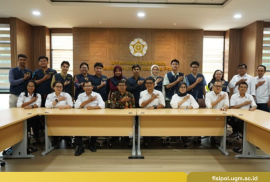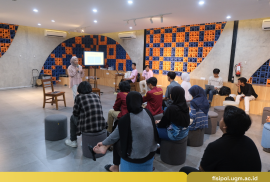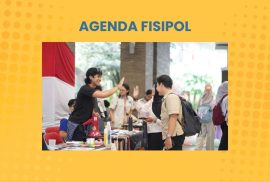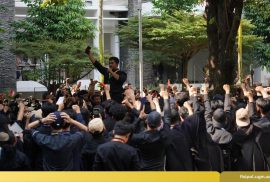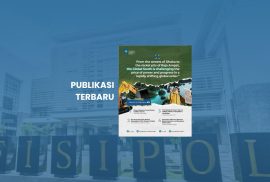Yogyakarta, January 5, 2026─The Faculty of Social and Political Sciences, Gadjah Mada University (Fisipol UGM), held a briefing and farewell event for the Fisipol Mengajar (Education Rehabilitation Volunteer Program) in Aceh on Monday (5/1). The Fisipol Mengajar program is an initiative of Fisipol UGM to contribute to post-disaster education recovery and rehabilitation efforts in Aceh. The program is fully supported by the university and is implemented in collaboration with the Sukma Foundation as a strategic partner. Twelve Fisipol UGM student volunteers will be deployed and placed in two different regions: Bireuen and Pidie Jaya. The twelve students will volunteer for 30 days, from January 10 to February 8, 2026.
SDGs 3: Good Health and Well-being
Yogyakarta, 27 October 2025─Peer counselors from the Career Development Center (CDC) of the Faculty of Social and Political Sciences, Universitas Gadjah Mada (FISIPOL UGM) are once again organizing Mental Health Society 2025, an initiative that aims to raise awareness and concern among students about the importance of mental health. This activity is a tangible contribution from FISIPOL UGM peer counselors, who are trained students who have undergone intensive selection and training with professional psychologists.
Yogyakarta, 12 September 2025 — The International Relations Student Corps (KOMAHI) of the Faculty of Social and Political Sciences (FISIPOL) at Universitas Gadjah Mada officially opened the International Relations English Competition (IREC) 2025, a prestigious annual event for high school students across Indonesia. Over three days, from 12–14 September 2025, participants showcase their English proficiency while deepening their understanding of pressing global issues.
The event began with a keynote lecture by Arief Rizky Bakhtiar, Senior Officer for Analysis and Monitoring on Trade, Industry, and Emerging Issues at ASEAN, who offered insightful perspectives on regional trade dynamics, industry trends, and key strategic issues.
The Faculty of Social and Political Sciences, Universitas Gadjah Mada (FISIPOL UGM), held the Sansiro Fair 2025, a two-day event (August 19–20) at Taman Sansiro. The fair brought together all student organizations and activity units at FISIPOL to introduce themselves to the incoming students of the 2025/2026 academic year.
At the exhibition, new students were able to explore a wide range of opportunities for self-development—from student organizations in each department and Student Activity Units (UKM) in arts, spirituality, research, and knowledge, to special service units such as mental health support and career development.
Yogyakarta, August 17, 2025 — To celebrate the 80th Independence Day of the Republic of Indonesia, FISIPOL UGM distributed 250 free cups of coffee to lecturers, staff, and students in attendance.
The event, held at the Tangga Baru area of Digilib Café, was enlivened by a communal breakfast and live music from GASPOL Band, creating a warm and festive atmosphere.
Beyond serving as a casual gathering for the academic community, the occasion also marked the launch of new menu items soon to be available at Digilib Café FISIPOL UGM.
Yogyakarta, August 7, 2025 — The series of events for PIONIR Society FISIPOL UGM 2025 officially concluded with the Consolidation, Action Simulation, and Inauguration. Quoting Tan Malaka, “Idealism is the final luxury possessed by the youth,” this very spirit was instilled through open forums and public orations.
New students were invited to discuss two critical issues in Indonesia’s socio-political landscape: the commercialization of education in state universities and freedom of expression. They were not only encouraged to voice their opinions but also to understand that oration is not merely about speaking loudly—it serves as a medium to deliver sharp, argumentative, and substantive criticism.
The third edition of IIS UGM’s Monthly Review is here, bringing you fresh insights and the latest knowledge!
Featured articles in this issue include:
• When Vietnam’s Lotus Blooms in BRICS Water (Christopher Paller Gerale, Universitas Negeri Malang)
• The Structural Crisis Behind Bangladesh’s 2024 Student Protest (Allene Florence Fadhilah Darmawan, Department of International Relations UGM, 2023)
• The Making of Macan Asia in A Shifting Western Geopolitical Landscape (Aminah Rafa, Department of International Relations UGM)
• Indonesia’s Dilemma Between Nickel Extraction and Biosphere Preservation (Paramasatya Rakha Abiyoga, Department of International Relations UGM)
Yogyakarta, August 6, 2025 — The Financial Transaction Reports and Analysis Center (PPATK)’s policy of freezing “idle” bank accounts has stirred controversy among the public. Tens of millions of accounts that have shown no activity in the past three months have been categorized as dormant or inactive. The freeze, according to PPATK, aims to prevent criminal misuse of inactive accounts for illegal activities such as money laundering and account trading.
Professor Dr. Wahyudi Kumorotomo, a lecturer at the Faculty of Social and Political Sciences (FISIPOL), Universitas Gadjah Mada, described PPATK’s decision as a form of “brute-force” policy — a trial-and-error approach that fails to account for many important aspects. He noted that this is not the first time the government has issued underdeveloped policies. “Time and again, the people have witnessed that policies issued by the current administration are lacking in professionalism, and if such actions are allowed to recur, they risk further eroding the President’s legitimacy,” he stated.
Yogyakarta, 5 August 2025 — The Dean’s Office of the Faculty of Social and Political Sciences (FISIPOL) at Universitas Gadjah Mada conducted a series of special meetings with each department on 4–5 August 2025. Held in the respective department rooms, the initiative followed an evaluation carried out by the University’s Quality Assurance and Reputation Unit (SPMRU) together with the faculty’s Human Resources team, which highlighted urgent issues related to the determination of lecturer homebase and the acceleration of academic career progression.
Monday, 4 August 2025 — The Dean of the Faculty of Social and Political Sciences at Universitas Gadjah Mada (FISIPOL UGM), Dr. Wawan Mas’udi, warmly welcomed the parents and guardians of the 2025 cohort at FISIPOINT, FISIPOL UGM. This gathering served as an important moment to strengthen the relationship between the faculty and students’ families, positioning them as partners in supporting the students’ educational journey.
In his remarks, the Dean extended a heartfelt welcome and expressed gratitude for the trust placed in FISIPOL UGM as the academic home for their sons and daughters.

